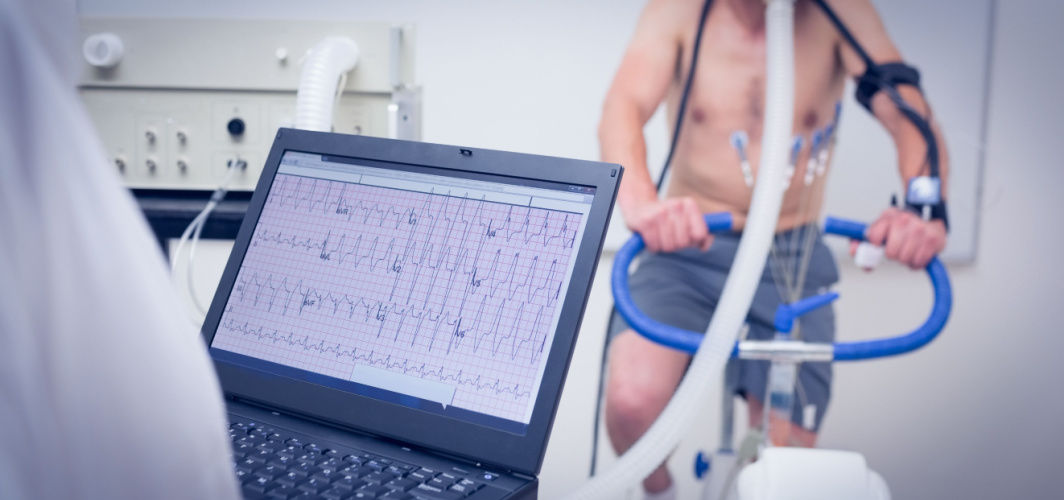Heart Conditions
Types Of Heart Tests: Uses And When To Contact A Doctor
10 min read
By Apollo 24|7, Published on - 16 August 2023, Updated on - 23 August 2023
Share this article
0
8 likes

Heart diseases often remain asymptomatic (exhibiting no signs) unless they become critical. This is when various heart tests come in handy. Heart tests are essential tools used by medical professionals to evaluate the functioning of the heart, diagnose various heart conditions, monitor their progression, and assess the effectiveness of treatments. Early detection of heart problems through these tests can significantly improve outcomes and increase the chances of successful treatment interventions.
When to go for a Heart Test?
Regular heart tests are important for individuals with risk factors such as high blood pressure, diabetes, a family history of heart disease, or a sedentary lifestyle. Furthermore, you must consider getting a heart test or consulting a doctor, if you experience the following signs:
- Chest pain or discomfort
- Shortness of breath
- Rapid heartbeat
- Dizziness or fainting
- Fatigue or weakness
Non-Invasive Heart Tests
Heart tests that do not require the insertion of any instruments are called non-invasive tests. Non-invasive heart tests are often the first line of investigation for heart conditions.
1. Electrocardiogram (ECG or EKG)
Purpose and uses of an ECG
This test measures the electrical activity of the heart and can help detect irregular heart rhythms, heart attacks, and other abnormalities.
Procedure and interpretation of results
During an ECG, small electrodes are placed on the chest, arms, and legs. These electrodes pick up the electrical signals produced by the heart and display them on a graph. The results of an ECG can help determine if further tests or medical interventions are needed.
2. Stress Test
Purpose and uses of a stress test
The purpose of a stress test is to assess how well the heart functions during physical activity. This test can help diagnose coronary artery disease, determine the effectiveness of medications or interventions, and evaluate exercise tolerance.
Different types of stress tests
The two different types of stress tests include; exercise stress test and pharmacological stress test.
- During an exercise stress test, you will be asked to walk on a treadmill or pedal on an exercise bike while your heart rate and blood pressure are monitored.
- A pharmacological stress test is done for individuals who are unable to exercise, and it involves using medication to simulate the effects of exercise on the heart.
Procedure and interpretation of results
The results of a stress test can provide important information about your heart's overall health. Abnormal findings may indicate underlying heart problems, such as blocked arteries or an irregular heart rhythm.
3. Echocardiogram
Purpose and uses of an echocardiogram
The echocardiogram is a non-invasive test that uses sound waves to create detailed images of your heart.
Procedure and interpretation of results
It provides information about the structure and function of your heart, including the size, shape, and movement of its chambers and valves. This test can help diagnose conditions such as heart valve problems, heart muscle disease, and congenital heart defects.
Invasive Heart Tests
Invasive heart tests may require the insertion of a catheter or other chemicals/devices to evaluate the heart thoroughly.
1. Cardiac Catheterization
Purpose and uses of cardiac catheterization
Cardiac catheterization is performed to diagnose and treat various heart conditions, including blocked arteries, valve problems, and congenital heart defects.
Procedure and risks involved
- Cardiac catheterization involves the insertion of a thin tube (catheter) into a blood vessel to reach your heart.
- During the procedure, a catheter is inserted through a blood vessel in your groin, arm, or neck and guided to the heart. Contrast dye may be injected to visualise blood flow.
- Risks include bleeding, infection, blood clots, or damage to blood vessels or the heart.
When to contact a doctor based on cardiac catheterization findings
After cardiac catheterization, contact your doctor immediately if you experience significant bleeding at the site of catheter insertion, chest pain, difficulty breathing, or signs of infection.
2. Coronary Angiography
Purpose and uses of coronary angiography
This diagnostic procedure involves injecting dye into the coronary arteries to visualize any blockages or narrowing. It helps doctors identify and assess the severity of coronary artery disease (blockage of arteries due to plaque deposition). Coronary angiography is typically performed before cardiac interventions like angioplasty or bypass surgery.
Procedure and risks involved
- During this test, a contrast dye is injected into the blood vessels of your heart, followed by X-ray imaging to assess blood flow.
- Risks may include bleeding or bruising at the insertion site, allergic reactions to the contrast dye, or damage to blood vessels or organs.
When to contact a doctor based on coronary angiography findings
- If there are significant blockages found, your doctor may recommend immediate intervention such as angioplasty or bypass surgery.
- If no significant blockages are found, but you continue to experience symptoms like chest pain or shortness of breath, it's important to follow up with your doctor for further evaluation.
- Any complications after the procedure such as bleeding, infection, or allergic reactions should be reported to your doctor immediately.
3. Electrophysiology Study (EPS)
Purpose and uses of an electrophysiology study
Electrophysiology study (EPS) is used to assess the electrical activity of the heart and diagnose abnormal heart rhythms or arrhythmias.
Procedure and risks involved
During an EPS, thin wires called catheters are threaded through blood vessels and into the heart to measure electrical signals. The procedure helps identify the source of abnormal rhythms and guides treatment decisions.
When to contact a doctor based on EPS findings
If you experience symptoms such as chest pain, shortness of breath, palpitations, or fainting episodes, it's crucial to seek medical attention immediately.
Blood Tests for Heart Health
Apart from imaging tests, there are some blood tests that can help determine your heart health.
1. Lipid Profile
Purpose and uses of a lipid profile test
A lipid profile test provides information about your cholesterol levels, including HDL (good) cholesterol, LDL (bad) cholesterol, and triglycerides.
Interpretation of results and recommended levels
Your doctor will interpret the results based on established guidelines. Recommended levels vary depending on factors such as age and underlying health conditions.
When to contact a doctor based on lipid profile findings
If your lipid profile reveals high cholesterol or triglyceride levels, it's important to consult a doctor. They can provide guidance on lifestyle modifications, prescribe medications if necessary, and monitor your heart health.
2. Cardiac Enzyme Tests
Purpose and uses of cardiac enzyme tests
They measure certain enzymes released into the bloodstream following a heart attack or other heart-related conditions. The specific enzymes measured include troponin, CK-MB, and myoglobin.
Interpretation of results and significance in diagnosing heart conditions
Cardiac enzyme tests help determine if there has been damage to the heart muscle. They are crucial in diagnosing or ruling out a heart attack. Elevated levels of cardiac enzymes suggest heart muscle damage.
When to contact a doctor based on cardiac enzyme test findings
It's essential to consult a doctor if you experience symptoms such as chest pain, shortness of breath, palpitations, or dizziness. Based on your symptoms and cardiac enzyme test results, they can provide appropriate guidance and treatment.
Holter Monitor and Event Recorder
1. Holter Monitor
The Holter monitor is a type of heart test that is commonly used to monitor and record the electrical activity of your heart over a period of time. It is a small, portable device that you can wear while going about your daily activities.
Purpose and uses of a Holter monitor
The purpose of the Holter monitor is to detect any irregularities in your heart's rhythm, such as arrhythmias or abnormalities in electrical activity. It can also help determine the effectiveness of certain medications or treatments for heart conditions.
Procedure and interpretation of results
During the procedure, electrodes are placed on your chest and connected to the Holter monitor. The monitor will then record your heart's electrical activity for a period of 24 to 48 hours, or sometimes longer.
When to contact a doctor based on Holter monitor findings
If you experience any symptoms such as chest pain, dizziness, fainting, or palpitations during the time you are wearing the Holter monitor, it is important to contact your doctor immediately. These symptoms could indicate a serious underlying heart condition that needs prompt medical attention.
2. Event Recorder
An event recorder, also known as an ambulatory electrocardiogram (ECG) monitor, is a type of heart test that helps diagnose irregular heart rhythms or palpitations. It is a small device that you can wear for an extended period, typically for 1-2 weeks.
Purpose and uses of an event recorder
An event recorder is used to capture your heart's electrical activity when you experience symptoms like dizziness, chest pain, or rapid heartbeat. It helps in diagnosing arrhythmias, such as atrial fibrillation, that may occur intermittently.
Procedure and interpretation of results
The event recorder is easy to use. When you feel symptoms, you press a button to record the heart's electrical activity. The device stores this information, which can be later analyzed by your doctor. Your doctor may compare the recorded events with your symptoms to determine the underlying cause.
When to contact a doctor based on event recorder findings
If you are already using an event recorder and notice any significant changes in your symptoms or new symptoms occur, it is essential to inform your doctor promptly.
Lifestyle Changes and Heart Health Tips
By incorporating healthy habits into your daily routine, you can significantly reduce the risk of heart problems.
1. Dietary recommendations
- Emphasise a balanced diet rich in fruits, vegetables, whole grains, and lean proteins.
- Choose healthier cooking methods like grilling, steaming, or baking instead of frying.
- Limit the intake of saturated fats, trans fats, and cholesterol found in fried foods, processed snacks, and fatty meats.
- Include heart-healthy fats like olive oil, nuts, and seeds in moderation.
- Opt for low-fat dairy products and reduce salt intake to promote healthy blood pressure levels.
2. Exercise recommendations for cardiovascular fitness
- Engage in moderate aerobic exercises for at least 150 minutes per week or vigorous exercises for 75 minutes per week.
- Consider activities like brisk walking, jogging, swimming, cycling, or dancing to improve cardiovascular fitness.
- Incorporate strength training exercises at least twice a week to build muscle and improve overall endurance.
- Consult with your healthcare provider before starting any exercise program, especially if you have pre-existing heart conditions.
3. Stress management techniques for heart health
- Implementing stress management techniques is essential for maintaining heart health.
- Practice relaxation techniques such as deep breathing exercises, meditation, or yoga to reduce stress levels.
- Engage in activities that bring you joy and help you unwind, such as hobbies, spending time with loved ones, or listening to music.
- Prioritise self-care and ensure you get enough sleep to promote overall well-being and reduce stress.
Conclusion
Heart tests are an essential tool in diagnosing and monitoring heart health. There are several types of heart tests available that can provide valuable insight into the condition of your heart. These tests help healthcare professionals assess your risk for heart disease, detect any abnormalities, and monitor the effectiveness of your treatment. If you experience symptoms such as chest pain, shortness of breath, or palpitations, it is important to contact a doctor immediately.
For more information,
FAQs
Q. How can heart tests help diagnose heart problems?
They can detect abnormal rhythms, blockages in the arteries, structural abnormalities, and heart muscle damage. They provide crucial information for doctors to make accurate diagnoses and develop treatment plans.
Q. Are heart tests safe?
Most heart tests are considered safe with minimal risks. However, cardiac catheterization carries a slightly higher risk due to its invasive nature.
Q. How often should I get a heart test done?
It depends on your risk factors and medical history. Consult with your doctor to determine the frequency.
Q. When should I contact a doctor after a heart test?
You should contact a doctor after a heart test if you experience worsening symptoms or new symptoms after the test or if you have any concerns about the results.
Q. What are the reasons that doctors recommend heart tests?
Doctors recommend heart tests for several reasons including indigestion, pain in the chest, dizziness, heart palpitations, and nausea, among others.
Medically reviewed by Dr Sonia Bhatt.
Heart Conditions
Consult Top Cardiologists
View AllLeave Comment
Recommended for you

Heart Conditions
Arrhythmia: Causes, Symptoms, Diagnosis, Treatment & Prevention
Keep your heart healthy by understanding arrhythmia. Learn its causes, symptoms, diagnostic methods, treatment options, and preventive measures.

Heart Conditions
Dietary Fats: What's Good for Your Heart?
While some dietary fats offer certain health benefits when consumed in moderation, others have been linked to negative health effects. Knowing the difference can help people make the right choice.

Heart Conditions
Heart Healthy Diet: 5 Foods To Eat & Avoid If You Have A Heart Condition
The article discusses the importance of a heart-healthy diet, also known as a cardiac diet, in managing heart conditions and reducing the risk of complications. Learn about five foods to eat and avoid to maintain heart health and reduce the risk of heart disease
Subscribe
Sign up for our free Health Library Daily Newsletter
Get doctor-approved health tips, news, and more.
Visual Stories

Lower Your Cholesterol Naturally with These 7 Foods
Tap to continue exploring
Recommended for you

Heart Conditions
Arrhythmia: Causes, Symptoms, Diagnosis, Treatment & Prevention
Keep your heart healthy by understanding arrhythmia. Learn its causes, symptoms, diagnostic methods, treatment options, and preventive measures.

Heart Conditions
Dietary Fats: What's Good for Your Heart?
While some dietary fats offer certain health benefits when consumed in moderation, others have been linked to negative health effects. Knowing the difference can help people make the right choice.

Heart Conditions
Heart Healthy Diet: 5 Foods To Eat & Avoid If You Have A Heart Condition
The article discusses the importance of a heart-healthy diet, also known as a cardiac diet, in managing heart conditions and reducing the risk of complications. Learn about five foods to eat and avoid to maintain heart health and reduce the risk of heart disease
